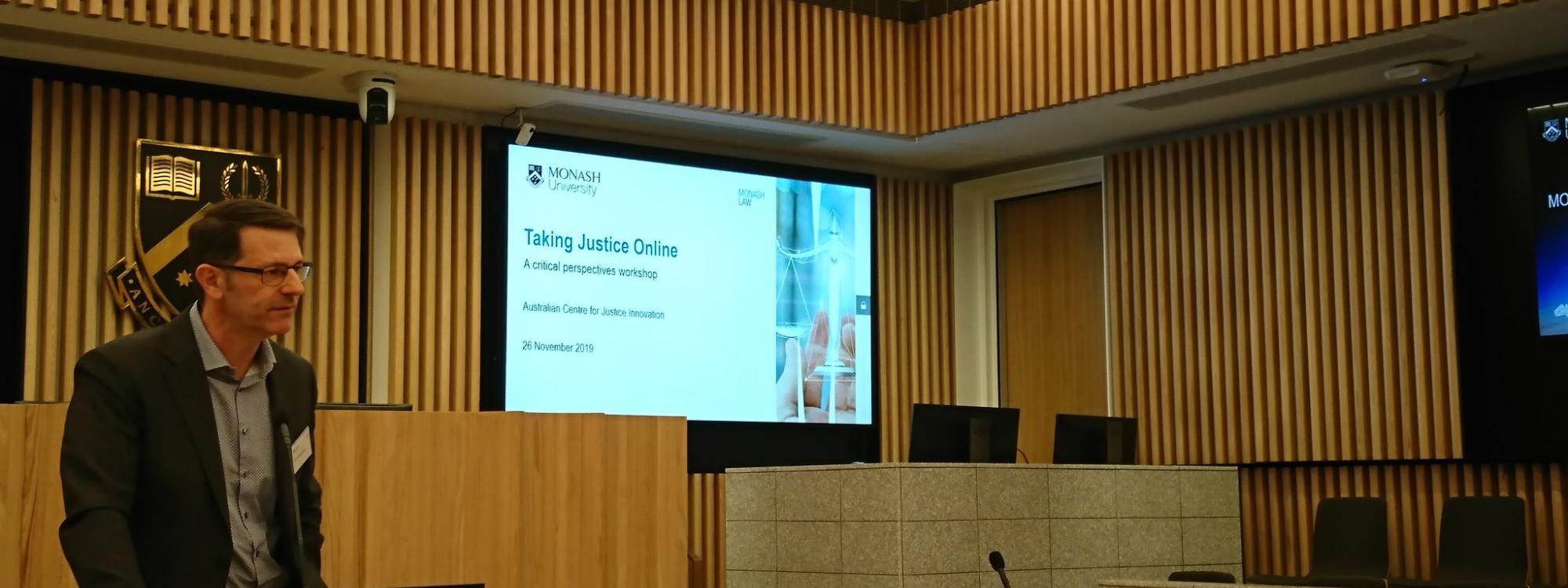
Taking dispute resolution online
Online dispute resolution or ODR is fast becoming a buzzword – but what does it mean? What are the world’s courts and tribunals doing in the online space, and what technologies are they actually using?
FLIP Stream Director Professor Michael Legg and Research Fellow Dr Felicity Bell braved a cold and blustery day in Melbourne to discuss these and other questions with researchers from Australia, New Zealand and Singapore. Organised by Associate Professor Genevieve Grant with the support of the Australian Centre for Justice Innovation in the Faculty of Law at Monash University, Taking Justice Online: A Critical Perspective workshop was held on 26 November.
The meaning of ODR is open to some interpretation – it encompasses courts, but also alternative dispute resolution mechanisms. Developing an accurate lexicon and taxonomy of ODR approaches is important to develop the field, especially if ODR needs to be regulated, and as courts and governments look to its adoption.
In his presentation, Michael focused on what courts and tribunals around the world are doing in the online space, asking more specifically about the nature of the technology actually being used and why it is chosen. The Civil Resolution Tribunal (CRT) in British Colombia, Canada, is a worldwide exemplar with its ‘solution explorer’ using an expert systems to guide disputants. In England and Wales, the report by Lord Justice Briggs on the civil courts alluded to using expert systems but none have been sighted in the pilots to date. The most advanced use of technology seems to emanate from China, where reportedly litigation risk assessment is performed by machine learning systems, and expert systems are used to assist parties and draft complaints. There is even a litigation guiding robot, Hubao. But little detail is available about how the tech works. However, in other jurisdictions the focus is on using simpler applications such as electronic filing and telephone or video conferencing.
An important question is why particular technologies are chosen Governments appear to be wary of spending money on new technologies for civil justice: civil justice itself is usually not prioritised, and tech can be expensive. As many courts may be starting from a low base, access to justice is sought to be improved through relatively small steps – like creating functional online portals for people to lodge documents. However, a focus only on automation may be the problem. Before adopting technology, it might be better to aim to simplify existing processes and learn what users need.
Some researchers raised ethical and regulatory questions about ODR design, such as Professor John Zeleznikow, a long time researcher in this area; and Dr Dorcas Quek Anderson from Singapore Management University. How people actually use and experience ODR was the focus of other research: Associate Professor Francesca Bartlett’s discussed her study indicating that the appearance and navigability of an ODR platform is just as important as its substantive content; and Dr Bridgette Toy-Cronin reported on findings that laypeople omit key information when drafting their own statements of claim. Other presentations likewise considered the at times awkward “fit” between legal tech and people’s problems.
There are plans to repeat the workshop, given the upsurge of interest in ODR for all types of dispute resolution.